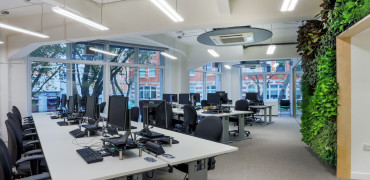I’ve just been involved in the move of our Central London office as the previous building in Park Street is being knocked down – no doubt to make way for some big, shiny, corporate glass tower, now deemed to be more in keeping with the gentrification of the space behind Tate Modern.
Park Street had proved an ideal location for us, as many of the central parts of London are within easy walking distance, and this is where a lot of consultant firms and corporate clients reside.
So we needed to find a new working space in a similar location but prices have risen ‘ever so slightly’ since we first arrived in the area over a decade ago, and the case for budget is now more challenging.
As a company, we also question the environmental sustainability and energy efficiency of all aspects of our operation, which means any new location had to be in a building that met our stance in this area.
So when I heard of a business run by Sustainable Ventures and dug a little deeper into what they do, I knew we might have found just what we needed.
Some of these will quickly become household names
Sustainable start-ups
Sustainable Ventures started when the serial entrepreneur founders were struggling to find space to grow their sustainable start-ups.
So in 2015 they opened their first space under some railway arches on the South Bank and this has grown into a community interest company, with a second location now behind Tate Modern called Sustainable Bankside.
The founders also realised that there is benefit in mixing start-up companies and corporates as long as the balance is right and at Bankside, it is around 75% start-up and 25% corporate.
The Corporate side can lend their weight and contacts to the start-ups, who in return can challenge corporate thinking in the search for new (and more sustainable) ways of doing business.
What that means for us is that we now have a managed, drop-in office space in an excellent location, with the added advantage of sharing events, meeting rooms and communal space with some truly pioneering sustainable businesses.
I promise you that some of these will quickly become household names.
Pioneering innovation
There are currently over 30 start-ups in Bankside and the ones that have jumped out for me so far include:
Home electric storage company, Powervault;E-Car the UK’s leading low-emission car club; eco-friendly, bamboo toilet paper company the Cheeky Panda; and Biohm, who use nature to create truly sustainable circular buildings that are conducive to our health & wellbeing.
E-car has already been sold to Europcar and the programme is now being rolled out to more and more cities, which shows what can happen when inspirational ideas are given space and support.
Sustainable Bankside also means that we as a corporation can use our networks and contacts to help where we can ... and we can get inspiration that can help us meet our own corporate mission to help society and grow our own sustainable business.
And it looks like there will be plenty of opportunities to mingle with these companies, with a growing programme of communal events aimed at pushing the sustainable message – right in the heart of London.
Oh and did I mention Toast? The ale company that brews beer from fresh surplus bread and uses all profits to tackle food waste?
So, the next time you are in London let’s grab a toast or two and see how we can help business grow sustainably.




